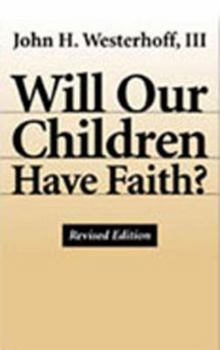Will Our Children Have Faith? Revised Edition
Select Format
Select Condition 
Book Overview
The revised edition of a classic in Christian education Originally written in 1976, this classic critique of Christian education is back in a revised edition. Christian education, according to Westerhoff, has modeled itself on the schooling-instructional paradigm of our secular schools. Instead of expecting faith formation to happen within a variety of contexts -- the family, church, school, and the church school -- religious education has been relegated...
Format:Paperback
Language:English
ISBN:0819218367
ISBN13:9780819218360
Release Date:February 2000
Publisher:Morehouse Publishing
Length:176 Pages
Weight:0.46 lbs.
Dimensions:0.3" x 5.6" x 8.4"
Related Subjects
Christian Books & Bibles Christian Living Education Religion Religion & SpiritualityCustomer Reviews
2 ratings
Faith in community
Published by Thriftbooks.com User , 21 years ago
Westerhoff's book, `Will Our Children Have Faith?' is interesting in format. Unlike many revised editions that incorporate revisions directly into the text, this one appears to leave the text of the 1976 edition intact, with addendum updates added at the conclusion of each chapter. This kind of revision is one that makes it easy on scholars and other interested readers - one doesn't have to guess which parts are new and revised. In some cases, Westerhoff softens his criticism (for instance, regarding church school); in other instances, Westerhoff clarifies earlier points, or makes subtle shifts of context and nuance that come from increased experience and reflection. Westerhoff's 1970s criticism of church school starts out rather dramatic in tone: a `very serious disease', he calls it, distinguishing himself from others who see the problem as more of a `surface infection'. (p. 2) He saw the problem as a general systemic problem with society as well as the theoretical framework: `The church's educational problem rests not in its educational programme, but in the paradigm or model which undergirds its educational ministry - the agreed-upon frame of reference which guides its educational efforts.' (p. 5) Speaking of scholars and church education program theory of the past, Westerhoff states they agreed that `the church teaches most significantly through nurture in a worshiping, witnessing community of faith, and they clearly explained that explicit instruction in the church schools was only a small part of Christian education.' (p. 4) His 1990s update is somewhat less critical of church school itself, but many of his criticisms remain for the overall paradigm of instructional education. Westerhoff identifies some conceptual problems with Christian education today. `Education correctly understood is not identical with schooling. It is an aspect of socialization involving all deliberate, systematic and sustained efforts to transmit or evolve knowledge, attitudes, values, behaviours, or sensibilities.' (p. 14) Too often, Christian education had followed the pattern of general education in that `we seem to have created an institution more concerned with teaching strategies, instructional gimmicks, and curricular resources than with spiritual mentors.' (p. 83) In a text reminiscent of Howard Gardiner's multiple intelligences theory, Westerhoff states: `Today we desperately need to remind ourselves that both the artistic and the rationalistic perspectives have value, and that a return to congregational singing of the St. Matthew Passion is as important for understanding and interpreting the story of our faith as the critical literary-historical study of its message.' (p. 69) Not only do different methods need to be employed, but the recognition that people learn in different ways and have different intellectual aspects to which they respond must be considered. In addition to this, Westerhoff is concerned about the single-mindedness of instructional-based
Critically important for parents, clergy, educators.
Published by Thriftbooks.com User , 24 years ago
Will Our Children Have Faith? was first published in 1976 and became a classic work on Christian education. Now it has been revised and updated to include a new foreword, chapter updates, and an afterword that incorporates John Westerhoff's thinking (and rethinking) of the issues in Christian education that have arisen in the last quarter century. Westerhoff points out that Christian education modeled itself on the curriculum approach of secular schools, thereby relegating religious education for children entirely to Sunday morning classes, and disregarding a variety of other educational contexts and opportunities represented by the family and the community of faith. The principle message of Will Our Children Have Faith? is that teaching facts alone is insufficient in communicating, nourishing and nurturing faith in our children. Will Our Children Have Faith? is critically important reading for parents, clergy, as well as church school administrators and teachers.





